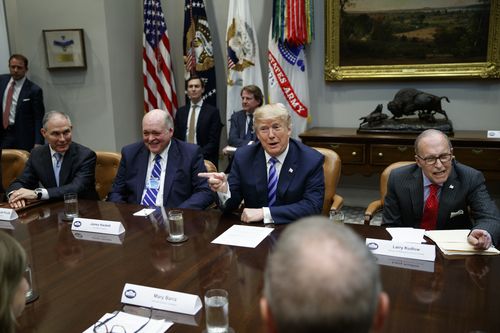Gregory Korte and Todd Spangler, USA Today and Detroit Free Press Published 10:34 a.m. ET May 23, 2018 | Updated 10:32 p.m. ET May 23, 2018

President Donald Trump speaks during a meeting with automotive executives in the Roosevelt Room of the White House, Friday, May 11, 2018, in Washington. From left, Environmental Protection Agency administrator Scott Pruitt, Ford CEO James Hackett, Trump, and White House chief economic adviser Larry Kudlow.
(Photo: Evan Vucci, AP)
WASHINGTON — President Trump on Wednesday started a process that could lead to tariffs on imported cars, trucks and auto parts, potentially expanding to the auto industry the same protectionist measures he’s threatened on aluminum and steel.
Trump said he asked Commerce Secretary Wilbur Ross to investigate whether auto imports are a threat to national security. If so, he would be able to institute tariffs under Section 232 of the Trade Expansion Act of 1962 — one of the strongest trade tools in the president’s arsenal.
“Core industries such as automobiles and automotive parts are critical to our strength as a Nation,” Trump said in a short statement released by the White House Press Office.
John Bozzella, CEO of Global Automakers, which represents foreign automakers doing business in the U.S. and some domestic parts suppliers, criticized the move.
“If these reports are true, it’s a bad day for American consumers,” he said. “The U.S. auto industry is thriving and growing. Thirteen, soon to be 14 companies, produced nearly 12 million cars and trucks in America last year. To our knowledge, no one is asking for this protection. This path leads inevitably to fewer choices and higher prices for cars and trucks in America.”
Domestic automakers and the Alliance of Automobile Manufacturers, said they had no immediate comment.
The statement came after Trump earlier in the day promised “big news coming soon” for U.S. autoworkers.
There will be big news coming soon for our great American Autoworkers. After many decades of losing your jobs to other countries, you have waited long enough!
— Donald J. Trump (@realDonaldTrump) May 23, 2018
As he boarded Marine One at the White House later in the day, he linked his tweet to ongoing negotiations with Canada and Mexico over revisions of the North American Free Trade Agreement.
“I think your autoworkers and your auto companies in this country are going to be very happy with what’s going to happen,” Trump said, according to a report from the White House.
“You’ll be seeing very soon what I’m talking about. NAFTA is very difficult. Mexico is very difficult to deal with. Canada has been very difficult to deal with it. They have been taking advantage of the United States for a long time.
“I am not happy with their requests,” he continued. “But I will tell you, in the end, we win. We will win, and we’ll win big. We’ll get along with Mexico; we’ll get along with Canada. But I will tell you, they have been very difficult to deal with. They’re very spoiled — because nobody has done this. But I will tell you that what they ask for is not fair.”
For months, negotiations over rewriting NAFTA have been ongoing, Trump having promised during his campaign to either renegotiate its terms or withdraw from it entirely. But the parties missed what was considered a key deadline late last week to deliver a final agreement, if Congress was going to have time to take it up this year.
Now, there is some speculation that Trump could signal a move to withdraw from the agreement that he — and many industrial workers across the U.S. — have argued has cost American jobs that have moved out of the country, especially to Mexico. Automakers have generally been supportive of NAFTA, with supply chains and major investments having been made over decades in both countries.
Southeast Michigan is closely tied to Ontario in auto production, with more than $70 billion of vehicles, parts and other items travel between the two each year.
The Wall Street Journal was first to report the tariff plan, saying Trump would seek new tariffs of as much as 25% on automobile imports.
“Tariffs based on national-security arguments generally take months to execute,” the Journal report said, “because the administration is required to conduct detailed studies that provide the rationale for such moves. Applying tariffs or another remedy under Section 232 of the 1962 law would require a lengthy investigation and report from the U.S. Commerce Department.”
Earlier this year, he used section 232 to impose 25% tariffs on steel imports and 10% on aluminum, but offered temporary exemptions to the European Union, Canada, Mexico and a number of other allies. The tariffs are in effect for other countries, including China and Russia.
On NAFTA, if Trump does signal a withdrawal, he’ll have to give Congress and the parties six months’ notice that he intends to do so, which could potentially result in more negotiating leverage. Many business interests across the country are adamant about remaining in the agreement, even if they see a need for its renegotiation.
Trump’s action comes at a time when his administration is being criticized for threatening China with import tariffs only to back off, for now, with few concrete gains to show for it.
Related:
Contact Todd Spangler at 703-854-8947 or at tspangler@freepress.com. Follow him on Twitter at @tsspangler.
Read or Share this story: https://on.freep.com/2s6fOVY
